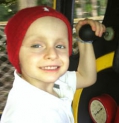Arginine Depletion with DFMO in High-Risk Neuroblastoma

Despite intensive treatment, about half of all children with high-risk neuroblastoma die of their disease. These aggressive tumors often have a mutated MYCN gene, which drives tumor cell growth by helping them to produce the necessary building blocks for DNA, proteins, and polyamines. Polyamines are essential chemicals created from amino acids like proline and arginine that enable cells to grow and to survive. Tumors with high levels of polyamines behave aggressively and can resist treatment. Arginine is a specific amino acid that plays many other roles in tumor progression, including altering the ability of immune cells to see and kill tumor cells. Many tumors alter their immune environmental surroundings to create a hostile environment that helps them evade the immune system. We study neuroblastoma in genetically modified mice that spontaneously develop high-risk neuroblastomas at places inside the body similar to where they arise in children. These mice have normal immune systems, and their tumors' immune environments are also similar to those in children with neuroblastoma. We have found that inhibiting polyamine production with difluoromethylornithine (DFMO) prolongs mouse survival from neuroblastoma, but all mice eventually die from their tumors. However, when we also remove proline and arginine from their diet when treating with DFMO, we cure more than half of the mice, a finding we have not previously seen. We plan to build upon this previous finding to learn how this treatment cured these mice so we can hopefully apply this knowledge to treating children with neuroblastoma.
Project Goal:
Because of our striking discovery that DFMO and the proline/arginine deficient diet can cure mice with neuroblastoma, this project aims to specifically clarify the role of arginine in blocking neuroblastoma growth. One of our goals is to determine whether a combination of DFMO and a arginine-deficient diet has similar survival results. Our other goal is to characterize the effects of arginine depletion and DFMO upon the immune microenvironment and to determine how it affects the tumor's populations of T cells and NK cells. We will evaluate the effects of this treatment on the immune microenvironment, signaling proteins, and immune cells. If effective, this treatment combination could be translated into a clinical therapeutic regimen to improve the survival of children with high-risk neuroblastoma.
Project Update 2024:
This project is focused upon understanding how a combination of difluoromethylornithine (DFMO), a modified amino acid, and a diet lacking in arginine affects high-risk neuroblastoma tumors. We have studied DFMO in combination with mouse chow deficient in arginine and proline, an amino acid that typically gets converted into arginine in neuroblastoma. We have shown that this combination, which does not include any chemotherapy or specific anti-tumor drugs, prolongs the overall and tumor-free survival of two types of mice: TH-MYCN+/+ mice (which spontaneously grow neuroblastoma tumors, typically die within 45 days of life, and have an intact immune system) and immunocompromised mice implanted with a human neuroblastoma tumor (IMR5) under their skin. In this past year, we have also found that the dietary removal of arginine alone, when combined with DFMO, can also shrink mouse tumors and enable them to live longer. However, this effect is not quite as pronounced as in mice that had a more profound arginine depletion with the simultaneous removal of proline. We have collected all of the tumors from these mice and are studying their RNA and cytokine/chemokine levels to better understand 1) how the combination of DFMO and removal of arginine prevent neuroblastoma growth and 2) how this treatment affects the local immune system (tumor microenvironment) within each tumor. So far, we have tested a few tumors’ RNA and have found that, interestingly, tumors with DFMO and a proline/arginine deficient diet have upregulated immunosuppressive genes, as well as increased expression of genes affiliated with macrophages, a type of white blood cell that can be programmed by the tumor microenvironment to either promote or inhibit tumor cell growth. Tumors that only had arginine removed, however, uniformly demonstrated decreased expression of immune-stimulating genes. We have also begun to look at the cytokines and chemokines in each tumor and have found that DFMO alone is affiliated with an increase in all three types of TGFß, a context-dependent immune molecule that has both pro-tumor and anti-tumor effects. DFMO-treated tumors also have an increase in macrophage colony stimulating factor (M-CSF), which triggers the growth of macrophages.We are in the process of completing all our RNA and cytokine analyses for each tumor generated in our TH-MYCN+/+ mice, as well as designing and testing a streamlined way to create a tumor “fingerprint” showing how RNA and protein expressions interacts. This year, we will also test a drug that prevents the activity of arginine to see if we can replicate the success of DFMO with the dietary intervention. Ultimately, these efforts will help us to develop this therapeutic strategy for its eventual translation to a treatment for children with high-risk neuroblastoma.

